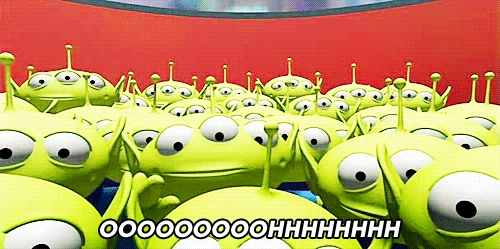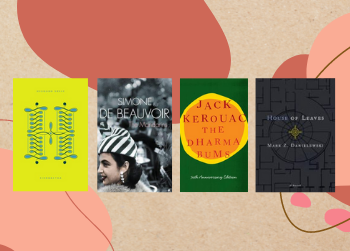“Life has no meaning the moment you lose the illusion of being eternal.”
– Jean-Paul Sartre.
 via GIPHY Aliens from Toy Story (Toy Story, 1995)
via GIPHY Aliens from Toy Story (Toy Story, 1995)
Existentialism aims to unravel some of the most profound issues around human existence. Taking as their starting point the confusion, anxiety, and disorientation they feel at a seemingly pointless and absurd world. This viewpoint came into focus originally with European philosophers in the 19th and 20th Century with philosophers such as Søren Kierkegaard, Fyodor Dostoevsky, Jean-Paul Sartre, and Friedrich Nietzsche.
This philosophical approach has influenced the creation of many works of art from films such as The Seventh Seal, Taxi Driver, Easy Rider, One Flew Over the Cuckoo’s Nest, A Clockwork Orange, Groundhog Day, Apocalypse Now, Badlands, Blade Runner and even the Toy Story films.
But the main artistic avenue used to explore and incorporate existential ideas has been fiction.
The existential viewpoint has proven fertile ground for writers. With its promise as a route to explore the issues relating to the purpose, meaning and the existence of life, or the indeed the lack of meaning behind these concepts.
From classic masterpieces by authors such as Louis-Ferdinand Céline, Jean-Paul Sartre, Simone de Beauvoir, Franz Kafka, and Hermann Hesse, to slightly more modern writers such as Philip K. Dick, Kurt Vonnegut, and Jack Kerouac, and a thread of existential writers continues right up to this day with authors such as David Foster Wallace, Chuck Palahniuk, Mark Z. Danielewski and Marilynne Robinson.
Below is a very small selection of the existential novels available to borrow from our catalogue.
Death on credit / Céline, Louis-Ferdinand
” In Death on Credit, Ferdinand Bardamu, Celine’s alter ego, is a doctor in Paris, treating the poor who seldom pay him but who take every advantage of his availability. The action is not continuous but goes back in time to earlier memories and often moves into fantasy, the style becomes deliberately rougher and sentences disintegrate to catch the flavour of the teeming world of everyday Parisian tragedies, the struggle to make a living, illness, venereal disease, the sordid stories of families whose destiny is governed by their own stupidity, malice, lust and greed.” (Adapted from Catalogue)
The mandarins / Beauvoir, Simone de
“A Harper Perennial Modern Classics reissue of this unflinching examination of post-war French intellectual life, and an amazing chronicle of love, philosophy and politics from one of the most important thinkers of the twentieth century.” (Catalogue)
The trial / Kafka, Franz
“A novel of such ambiguity will inevitably lend itself to a diversity of interpretation, but in The Trial you can at least be sure to find every element of storytelling now defined as Kafkaesque.” (Catalogue)
Siddhartha : an Indian tale / Hesse, Hermann
“A young Brahmin named Siddhartha searches for ultimate reality after meeting with the Buddha. His quest takes him from a life of decadence to asceticism, from the illusory joys of sensual love with a beautiful courtesan, and of wealth and fame, to the painful struggles with his son and the ultimate wisdom of renunciation. Integrating Eastern and Western spiritual traditions with psychoanalysis and philosophy, written with a deep and moving empathy for humanity, Herman Hesse{u2019}s strangely simple Siddhartha is perhaps the most important and compelling moral allegory the troubled twentieth century ever produced.” (Catalogue)
The Dharma bums / Kerouac, Jack
“Two ebullient young men are engaged in a passionate search for dharma, or truth. Their major adventure is the pursuit of the Zen way, which takes them climbing into the high Sierras to seek the lesson of solitude, a lesson that has a hard time surviving their forays into the pagan groves of San Francisco’s Bohemia with its marathon wine-drinking bouts, poetry jam sessions, experiments in “yabyum,” and similar nonascetic pastimes.” (Catalogue)
Cat’s cradle / Vonnegut, Kurt
“Cat’s Cradle unfolds from the point of view of a narrator, who, in preparing to write a book, wants to know what some famous Americans were up to the day the atomic bomb was dropped on Hiroshima. He is led to the grown-up children of an absent-minded professor who was the “father of the atomic bomb.” They are the key to what follows, possessing the only example of their father’s last discovery, a potentially destructive kind of super-ice called “ice-nine.”Cat’s Cradle is a wild, hurtling apocalyptic tale that satirizes, among many other things, the blithe indifference and goofiness of the people who populate the nuclear science community.” (Catalogue)
Housekeeping / Robinson, Marilynne
“The story of Ruth and her sister Lucille, who grew up haphazardly. The family house is in the harsh environment of the Far West town of Fingerbone, USA. Ruth and Lucille’s struggle toward adulthood touches themes of loss and survival, and the undertow of transience.” (Catalogue)
Infinite jest : a novel / Wallace, David Foster
“A spoof on our culture featuring a drug-and-alcohol rehabilitation house near Boston. The center becomes a hotbed of revolutionary activity by Quebec separatists in revolt against the Organization of North American Nations which now rules the continent.” (Catalogue)
Mark Z. Danielewski’s House of leaves / Danielewski, Mark Z
“A blind old man, a young apprentice working in a tattoo shop, and a mad woman haunting an Ohio institute narrate this story of a family that encounters an endlessly shifting series of hallways in their new home, eventually coming face to face with the awful darkness lying at its heart.” (Adapted from Catalogue)


